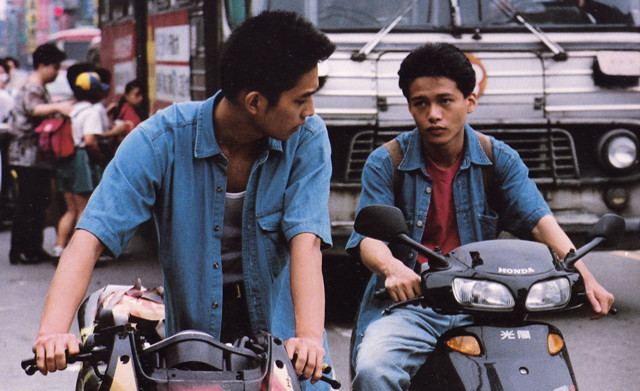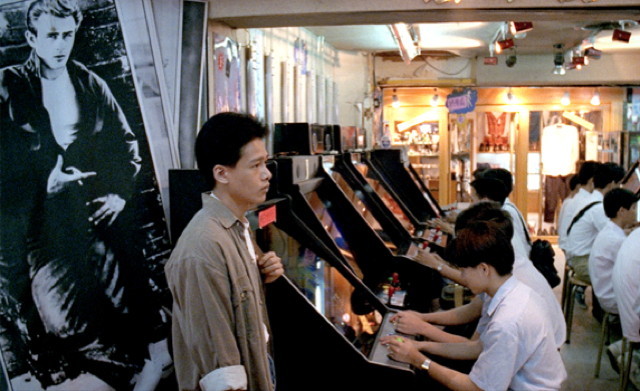
Ah Tze (Chen Chao-jung) and Hsiao-kang (Lee Kang-sheng) have strange connections in REBELS OF THE NEON GOD
REBELS OF THE NEON GOD (Tsai Ming-liang, 1992)
Film Society of Lincoln Center, Elinor Bunin Munroe Film Center: Howard Gilman Theater, 144 West 65th St. between Broadway & Amsterdam Ave., 212-875-5601
Quad Cinema, 34 West 13th St., 212-255-2243
Through Thursday, April 16
(Also April 17 at the Museum of the Moving Image)
bigworldpictures.org
 If you’re going to make a movie with the awesome title Rebels of the Neon God, it better be a damn fine, supercool, unusual, even rebellious film. And that’s exactly what Malaysian-born Taiwanese filmmaker Tsai Ming-liang’s debut feature is, a damn fine, supercool, unusual, and rebellious film about teen angst and urban alienation in a changing Taipei. Written and directed by Tsai, who went on to make such other stunners as The River, The Hole, Vive l’Amour, and What Time Is It There?, among others, Rebels of the Neon God is a slowly paced minimalist tale of interrelated characters who come together in fascinating, unexpected ways. Lee Kang-sheng, whom Tsai discovered smoking a cigarette on the street (for the television piece Kids), stars as Hsiao-kang, a teenager who has decided to cash out of cram school without telling his parents. His father (Tien Miao), a cabdriver, and his mother (Lu Yi-ching), a spiritualist who believes that her son is the reincarnation of the rebel protection deity Nezha, don’t know what to do with their extremely quiet son, who seems to have little interest in life except for going to video arcades. Meanwhile, Ah Tze (Chen Chao-jung) is living an odd life himself, stealing change from public phone booths and becoming friendly with a young woman, Ah Kuei (Wang Yu-wen), who slept with his brother, Ah Bing (Jen Chang-bin). One afternoon, Ah Tze and Ah Kuei are on a scooter when they pull alongside Hsiao-kang and his father in a cab, and after getting honked at for blocking a lane, Ah Bing smashes the father’s side-view mirror, a deed that Hsiao-kang decides is not going to go unpunished.
If you’re going to make a movie with the awesome title Rebels of the Neon God, it better be a damn fine, supercool, unusual, even rebellious film. And that’s exactly what Malaysian-born Taiwanese filmmaker Tsai Ming-liang’s debut feature is, a damn fine, supercool, unusual, and rebellious film about teen angst and urban alienation in a changing Taipei. Written and directed by Tsai, who went on to make such other stunners as The River, The Hole, Vive l’Amour, and What Time Is It There?, among others, Rebels of the Neon God is a slowly paced minimalist tale of interrelated characters who come together in fascinating, unexpected ways. Lee Kang-sheng, whom Tsai discovered smoking a cigarette on the street (for the television piece Kids), stars as Hsiao-kang, a teenager who has decided to cash out of cram school without telling his parents. His father (Tien Miao), a cabdriver, and his mother (Lu Yi-ching), a spiritualist who believes that her son is the reincarnation of the rebel protection deity Nezha, don’t know what to do with their extremely quiet son, who seems to have little interest in life except for going to video arcades. Meanwhile, Ah Tze (Chen Chao-jung) is living an odd life himself, stealing change from public phone booths and becoming friendly with a young woman, Ah Kuei (Wang Yu-wen), who slept with his brother, Ah Bing (Jen Chang-bin). One afternoon, Ah Tze and Ah Kuei are on a scooter when they pull alongside Hsiao-kang and his father in a cab, and after getting honked at for blocking a lane, Ah Bing smashes the father’s side-view mirror, a deed that Hsiao-kang decides is not going to go unpunished.

Hsiao-kang (Lee Kang-sheng) finds a kindred spirit in James Dean in Tsai Ming-liang’s captivating debut feature
Inspired by the animated film Nezha Conquers the Dragon King and Nicholas Ray’s Rebel without a Cause, Tsai has crafted a mesmerizing, unpredictable, and wickedly dark comic tale that equates Hsiao-kang and Ah Tze in multiple ways; they both smash something, they both pleasure themselves, and they both experience problems with their mopeds, mirroring each other, although the latter is cool and disaffected while the former is peculiar and introverted. Tsai depicts Taipei as a city of crumbling infrastructure, falling apart as the population grows. The “neon god” of the title represents the video arcade games that draws in the teenagers; interestingly, the poster of James Dean that Hsiao-kang stands next to in the arcade, with Dean seemingly pointing at him, was already in the real-life arcade, not added as a prop. The title is also a nod to Simon and Garfunkel’s “The Sounds of Silence,” in which the duo sings, “But my words like silent raindrops fell / And echoed in the wells of silence / And the people bowed and prayed / To the neon gods they made”; there is very little dialogue in the film, which relies on beautifully composed visuals and Huang Shu-jun’s infectious, deep-toned musical theme. In addition, Tsai begins his long fascination with water; not only is it pouring rain as the film begins, but Ah Tze lives in an apartment that is perpetually flooded, although he doesn’t seem to care much at all about it. In fact, it’s hard to tell just what the disenchanted youths in the film do care about. Lee would go on to portray a character named Hsiao-kang in most of Tsai’s works, evoking the relationship between Jean-Pierre Léaud and François Truffaut in the Antoine Doinel series; Tsai has even cast Léaud in What Time Is It There? and Face. Rebels of the Neon God is finally getting its U.S. theatrical release, in a new HD restoration at the Film Society of Lincoln Center and the Quad through April 16, before making its way to Queens on April 17 as part of the Museum of the Moving Image tribute to Tsai, which continues through April 26 with such other fine fare as I Don’t Want to Sleep Alone, Journey to the West, Stray Dogs, and Goodbye, Dragon Inn.